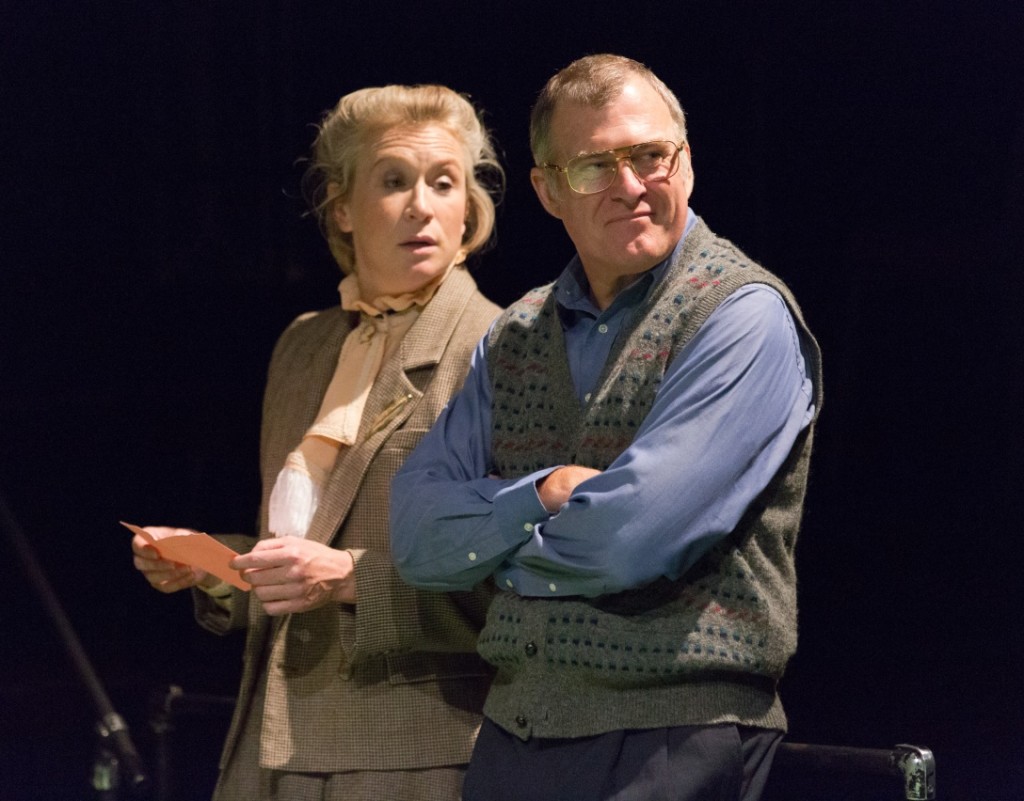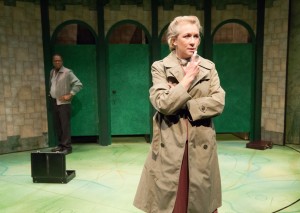
(The following first paragraph is lifted from an essay I wrote years ago: self-plagiarizing may be the perfect technique for reviewing this play. That essay was published in Modern Drama under the title, “Blizintsy/Dvojniki Twins/Doubles Hapgood/Hapgood.”)
Tom Stoppard’s play, Hapgood, is full of twins: British and Russian, real and imaginary, overt and covert, psychological and biological, nominative and designative (i.e., Joe and joe—in British spy lingo, a double agent). In the duplicitous world of theater, where actors double—and triple—themselves, twinning is crucial. In the duplicitous world of espionage, where agents double—and triple—themselves, twinning is crucial. The plot turns—and turns again—on two sets of twins who are double agents, on twin sets of secret information, on twin scenes.
Lantern Theater’s production, directed by Peter DeLaurier, rises to the challenge of this enormously and gleefully complicated spy story which takes place during the late days of the Cold War. It’s 1980. It’s a waning battle; as the Spy Master sardonically comments, the British Secret Service, the KGB and the CIA are really just keeping each other business and ought to be sending each other Christmas cards.
Elizabeth Hapgood (McKenna Kerrigan), is “Mother” to her minions, to her colleagues and Mamushka to her lover turned agent, her “joe,” whose name happens to be Joseph Kerner (William Zielinski). She is also literally Mother to her son Joe (Charles LaMonaca/ Will Zielinski).

But Hapgood is not just a spy story, it’s also a physics story; Joseph Kerner is a world-class physicist since the Cold War was largely about the science of weapons. Zielinski projects both warmth and bemused intelligence, but his Russian accent garbles some of this already-hard-to-comprehend information speeches, and it is a shame to waste the lovely monologue about an atom’s quantum leap explained by the poetic image of a moth in a cathedral. Theater and physics twin each other: the central fact of the wave/particle theory of light is that the outcome is always altered by the act of observing the motion and position of the atom—just as a theatrical performance Is always altered by the act of observing, the presence of an audience.
Complicating both the spying and the drama are the thuggish Ridley twins (Damon Bonetti), who bring street smarts to a board game. Wading through the layers of lies and deceit are Hapgood’s friend Paul Blair (Christopher Patrick Mullen)—their emotional relationship isn’t made clear enough— and the American, Ben Wates (Kirk Wendell Brown) who navigates this very posh very English world, shaking his head, muttering, “You guys,” which is quite quite different from “You chaps.” English and English are twins, too.
The first set (scenic design by Nick Embree) offers what seems to be five doors; this offers the promise of farce—or the promise of a shell game—two of many ways of thinking about the global world of “intelligence.”
Stoppard has sometimes been accused of being all brain and no heart, and Lantern’s production may not give the heart its due; this is a very brainy play, but we should feel the complex emotional ties these people have to each other. It is, nevertheless, an enormously entertaining evening and launches what promises to be a brave season of five heady shows at the Lantern.
[Lantern Theater at St. Stephens Theater, 10th and Ludlow streets] September 6=October 14, 2018; lanterntheater.org
